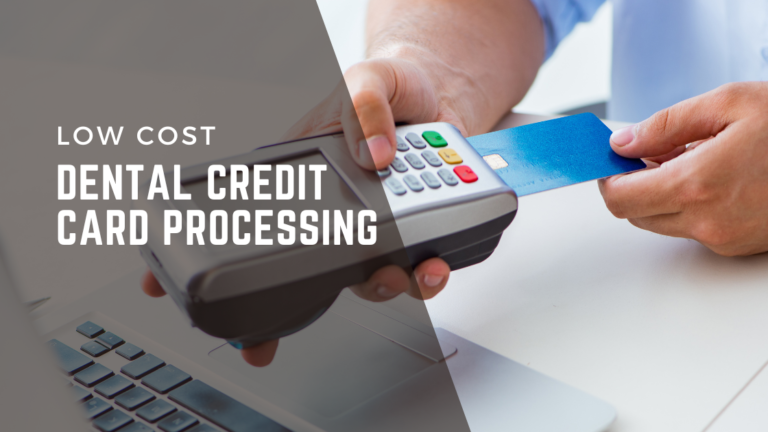Finance management as a component of owning a dental practice could be a daunting issue, especially pertaining to payment processing charges. Dental credit card processing systems can be a viable solution in terms of low prices but high quality when it comes to handling transactions.
These cost-effective solutions help dental practices improve their payment platforms, making it easier for patients and providing the practice with the necessary cash flow on a regular basis.
Understanding Credit Card Processing Fees
Card transactions also involve several charges that a dental practice can incur as they follow the basic guidelines for dental card processing. These fees include:
- Interchange Fees: In credit card processing, interchange fees are normally paid to the card-issuing bank, and they are usually the biggest part of the costs associated with the services. These have a certain distinction depending on the type of card, debit, credit, and reward, and also the type of transaction, either physical or online.
- Assessment Fees: Imposed by the card networks (Visa, MasterCard, and so forth), these are often post-fixed fees per transaction. These fees are typically a percentage of the transaction amount plus a fixed fee and can vary based on the type of card and transaction.
- Additional Fees: Others can be defined as charges such as chargeback fees, batch processing fees, and PCI compliance fees.
- Markup Fees: These refer to the fees charged by the payment processor or merchant service provider. Other expenses may include service charges levied monthly, per-transaction charges, and special rates like charges for entered transactions other than swipe transactions.

Selecting the Right Payment Processor
To minimize dental credit card processing costs, dental practices can adopt the following strategies:
Shop Around for the Best Rates
While all dental merchant processing is unique, there are more differences in terms of the fees they charge. To get started when choosing a payment processor, evaluate your practice requirements by evaluating transaction volume per month and average transaction value, desired form of payment (credit/debit card, mobile payments, etc.).
Choose the Right Pricing Model
Understanding the different pricing models offered by payment processors can help you choose the most cost-effective option:
- Interchange-Plus Pricing: This model splits the interchange fee from the processor’s margin, allowing for more visibility into the charges and possible, lower costs.
- Flat-Rate Pricing: Similar to the previous model, this model uses a fixed percentage for each concluded transaction, which is easy to calculate, although it might result in higher percentages for large-value operations.
- Tiered Pricing: Payments are segmented into three levels (premium, medium-premium, non-premium), each with its respective ratio. This model can be costly and not innovative as compared to the first one, and could lack transparency.
Leverage Technology:
Implementing better payment methods is a common strategy, with most promoting the use of advanced payment technologies to decrease dental card processing fees. For example, EMV chip card readers will minimize fraud, thus cutting on chargeback costs and possibly resulting in favorable interchange fee tiers.
Ensure PCI Compliance:
Also, it is necessary to determine whether the payment processor used complies with the Payment Card Industry Data Security Standards (PCI DSS). This compliance is important for safeguarding patient information and preventing liability costs incurred through a data leak.
Considerations in Selecting the Right Payment Processor
When selecting the right dental merchant processing, dental practices should look for the following key features:
- Cost Structure: Finally, assess all expenses based on the fees and charges that may be involved in the entire process. Select ‘no surprises’ pricing approaches that give detailed accounts of charges.
- Integration with Practice Management Software: The ideal payment processor should be compatible with your current practice management software. This integration can save time on billing and reconciling the business’s financial transactions.
- Customer Support: Select a processor with a solid customer service team that will promptly address any concerns. Investing in good support is necessary to maintain a constant flow of payments.
- Security Features: Firstly, focus on processors with high-level security measures for patients’ data and lower fraud chances. Search for processors capable of offering end-to-end encryption and tokenization services.
- Contract Terms: Consult the legal language of the contract, payment period, penalties for terminating the contract, and other restrictions that come with the contract. They should also explore ways to avoid long-term contracts or contracts with extremely high penalties for early termination.
Key Takeaways
Low-cost dental credit card processing is essential for the financial health and efficiency of dental practices. By understanding processing fees and implementing strategies to minimize costs, practices can reduce expenses, improve cash flow, and enhance patient satisfaction. Choosing the right payment processor not only streamlines operations but also boosts patient convenience and loyalty. Take action today to explore affordable dental credit card processing options at Blue Yonder Corp and transform your dental practice’s financial future.


